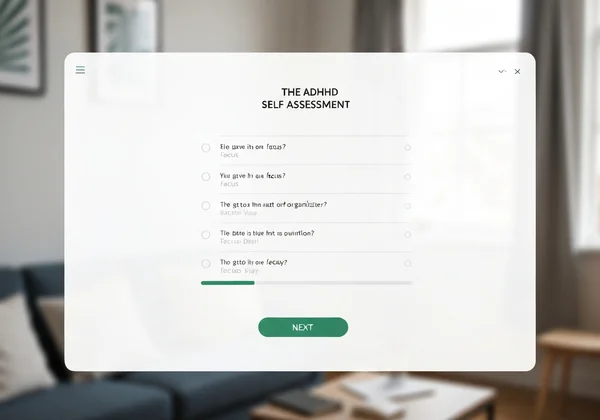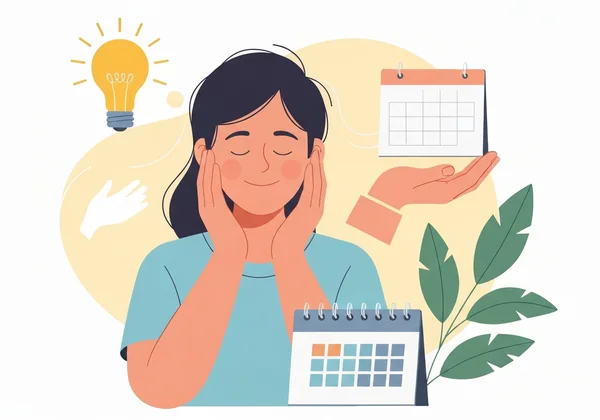The Ultimate Guide to Getting an Adult ADHD Assessment
November 20, 2025 | By Genevieve Hale
Feeling perpetually overwhelmed by a to-do list that never shrinks? Do you find yourself struggling with focus at work, constantly misplacing your keys, or missing important deadlines despite your best efforts? You're not alone, and you might be wondering if adult ADHD is the underlying reason. Feeling confused about getting an ADHD assessment? You're not alone. This guide will clarify the entire process, helping you find the support and understanding you need. A great place to begin is with a reliable online screening tool.

Recognizing Adult ADHD: Is It Time for an Assessment?
Before diving into the formal process, it's helpful to understand what you're looking for. Adult ADHD often looks different from childhood ADHD. The boundless energy might have turned into a constant inner restlessness, and the challenges with focus can impact careers, relationships, and self-esteem. Recognizing these signs is the first crucial step.
Key Symptoms of Adult ADHD: What to Look For
While experiences vary, adult ADHD symptoms typically fall into two main categories: inattention and hyperactivity/impulsivity. You don't need to experience all of them to be impacted.
- Inattention: This goes beyond simple daydreaming. It can manifest as difficulty organizing tasks, avoiding activities that require sustained mental effort (like filling out paperwork), being easily distracted by unrelated thoughts or stimuli, and frequent forgetfulness in daily activities.
- Hyperactivity-Impulsivity: In adults, this is often more subtle. It might feel like an inability to relax, excessive fidgeting, talking over others, or making hasty decisions without considering the long-term consequences, from impulse purchases to abrupt career changes.
ADHD or Anxiety? Understanding Overlapping Signs
Many people ask, "Do I have ADHD or anxiety?" This is a common question, as the two conditions share overlapping symptoms like restlessness, trouble concentrating, and feeling overwhelmed. Anxiety often involves excessive worry about future events, while ADHD challenges are typically present across various situations and are rooted in executive function difficulties. The two can also co-exist, making a clear picture even more crucial. An initial screening can help parse these feelings and provide a clearer direction for discussion with a professional.
How to Get Diagnosed with ADHD as an Adult
Once you recognize the signs in yourself, the next question is what to do about it. The path to a potential diagnosis is a structured process designed to provide you with accurate answers and actionable next steps. It doesn't have to be intimidating; it's about gathering information to better understand yourself.
Starting with an Online ADHD Self-Assessment: Your First Step
In today's digital world, the journey to clarity can begin from the comfort of your own home. An ADHD self assessment is a valuable, low-pressure first step. These tools, often based on clinically recognized questionnaires like the Adult ADHD Self-Report Scale (ASRS), guide you through a series of questions about your experiences. It's a structured way to reflect on your daily challenges and patterns. Taking an assessment provides you with a personalized summary that can validate your concerns and organize your thoughts, creating a solid foundation before seeking a professional opinion.

When to Seek Professional Guidance: Beyond the Screener
It is vital to understand that an online screener is a powerful informational tool, but it is not a formal diagnosis. Think of it as a preliminary map of your cognitive landscape. If the results from an online assessment suggest that you have traits consistent with ADHD, the next logical and responsible step is to seek professional guidance. This report is the perfect document to bring to a healthcare provider, giving them a clear and concise starting point for a deeper conversation.
The Adult ADHD Diagnosis Process: A Step-by-Step Guide
A formal diagnosis involves a comprehensive evaluation by a qualified professional. This process is thorough, ensuring that all factors are considered before a conclusion is reached. It's a collaborative effort between you and a healthcare expert to uncover the full picture.

Who Can Assess Adult ADHD? Finding the Right Professional
Several types of professionals are qualified to diagnose adult ADHD. It's important to find someone with experience in this specific area. Your search might include:
- Psychiatrists: Medical doctors who specialize in mental health and can prescribe medication.
- Psychologists: Experts in human behavior who conduct clinical interviews and psychological testing.
- Neurologists: Specialists in brain and nervous system disorders.
- Some Primary Care Physicians (PCPs): Certain family doctors have the training to conduct initial assessments and may refer you to a specialist.
What Happens During a Comprehensive Evaluation?
A formal evaluation is more than just a single conversation. It typically involves several stages designed to gather a complete history. You can expect a detailed clinical interview where you'll discuss your current challenges, as well as your childhood history, school performance, and work life. Your doctor may also ask for input from a spouse, parent, or close friend and have you complete detailed questionnaires and rating scales. This multi-faceted approach helps rule out other potential causes for your symptoms.
Understanding Assessment Tools and Diagnostic Criteria (DSM-5)
Clinicians rely on established criteria to ensure an accurate diagnosis. The primary guide is the Diagnostic and Statistical Manual of Mental Disorders, 5th Edition (DSM-5). This manual outlines the specific criteria for ADHD, including the number of symptoms required and evidence that they have been present since childhood. Professionals use standardized assessment tools like the DIVA (Diagnostic Interview for ADHD in Adults) or Conners' Adult ADHD Rating Scales to structure the evaluation and gather consistent, reliable data.
Getting Tested for ADHD: Cost, Benefits, and What Comes Next
Making the decision to get tested involves practical considerations like cost and time. However, the potential rewards of gaining clarity and a path forward can be life-changing. Understanding both the investment and the benefits is key to making an empowered choice.
How Much Does an ADHD Assessment Cost?
The cost of a formal ADHD assessment can vary significantly depending on your location, insurance coverage, and the type of provider you see. A full evaluation from a specialist can range from several hundred to a few thousand dollars. Some community mental health clinics may offer services on a sliding scale. While the cost can seem daunting, it's an investment in your well-being. Starting with a free online adhd assessment can help you decide if pursuing this investment is the right next step for you.
Is it Worth Getting Tested for ADHD? The Benefits of Clarity
Absolutely. For many adults, receiving a diagnosis is a moment of profound relief. It reframes a lifetime of struggles not as personal failures or character flaws ("I'm lazy" or "I'm not smart enough") but as the result of a neurodevelopmental difference. This clarity is the gateway to self-compassion and effective strategies. It unlocks access to appropriate support, empowers you to advocate for yourself at work or school, and allows you to finally understand why you are the way you are.
After the Diagnosis: Pathways to Support and Management
Think of a diagnosis not as a finish line, but a fresh start. It opens doors to various forms of support and management tailored to how your brain works. Treatment is multi-faceted and may include:
-
Therapy: Cognitive Behavioral Therapy (CBT) can help develop coping strategies.
-
Coaching: An ADHD coach can help with practical skills like organization and time management.
-
Medication: Stimulant or non-stimulant medications can be highly effective for many, as prescribed by a medical doctor.
-
Lifestyle Adjustments: Changes in diet, exercise, and sleep can also have a significant positive impact.

Your Journey to Clarity: Taking the Next Step
Navigating the world when your brain works differently can be exhausting, but you don't have to do it in the dark. Understanding the path to an adult ADHD assessment is the first step toward harnessing your unique strengths and managing your challenges. It's a journey to better understand yourself, find acceptance, and build a more fulfilling life.
Your journey can start right now. Take the first, simple step by gaining personalized insights into your attention and focus. Start Your Online ADHD Assessment today and begin your path toward clarity.
Frequently Asked Questions About Adult ADHD Assessment
How do I start the process of getting an ADHD assessment?
The easiest way to start is with a confidential online screening tool. This will help you organize your thoughts and provide a summary of your symptoms. You can then take this report to your primary care physician or a mental health specialist to begin the formal evaluation process.
What is considered the most accurate ADHD test for adults?
There isn't one single "test." The gold standard for accuracy is a comprehensive evaluation conducted by a qualified professional. This includes a detailed clinical interview, a review of your personal history, and the use of standardized rating scales aligned with DSM-5 criteria.
Can ADHD actually develop for the first time in adulthood?
According to the DSM-5 diagnostic criteria, ADHD is a neurodevelopmental condition, meaning symptoms must have been present before the age of 12. However, many adults may not have been diagnosed in childhood. Their coping strategies may have worked until the increasing demands of adulthood—like career, family, and financial responsibilities—made the underlying symptoms unmanageable.
Is an online ADHD assessment the same as a formal diagnosis?
No, and it's crucial to understand the difference. An online ADHD assessment, like the one offered on our site, is a screening tool. It is designed to identify traits consistent with ADHD and provide you with valuable insights. However, it cannot replace a comprehensive evaluation from a qualified healthcare provider, which is required for a formal diagnosis. Get your personalized insights to prepare for that conversation.
Disclaimer: This article is for informational purposes only and does not constitute medical advice. It is not a substitute for professional medical advice, diagnosis, or treatment. Always seek the advice of your physician or other qualified health provider with any questions you may have regarding a medical condition.